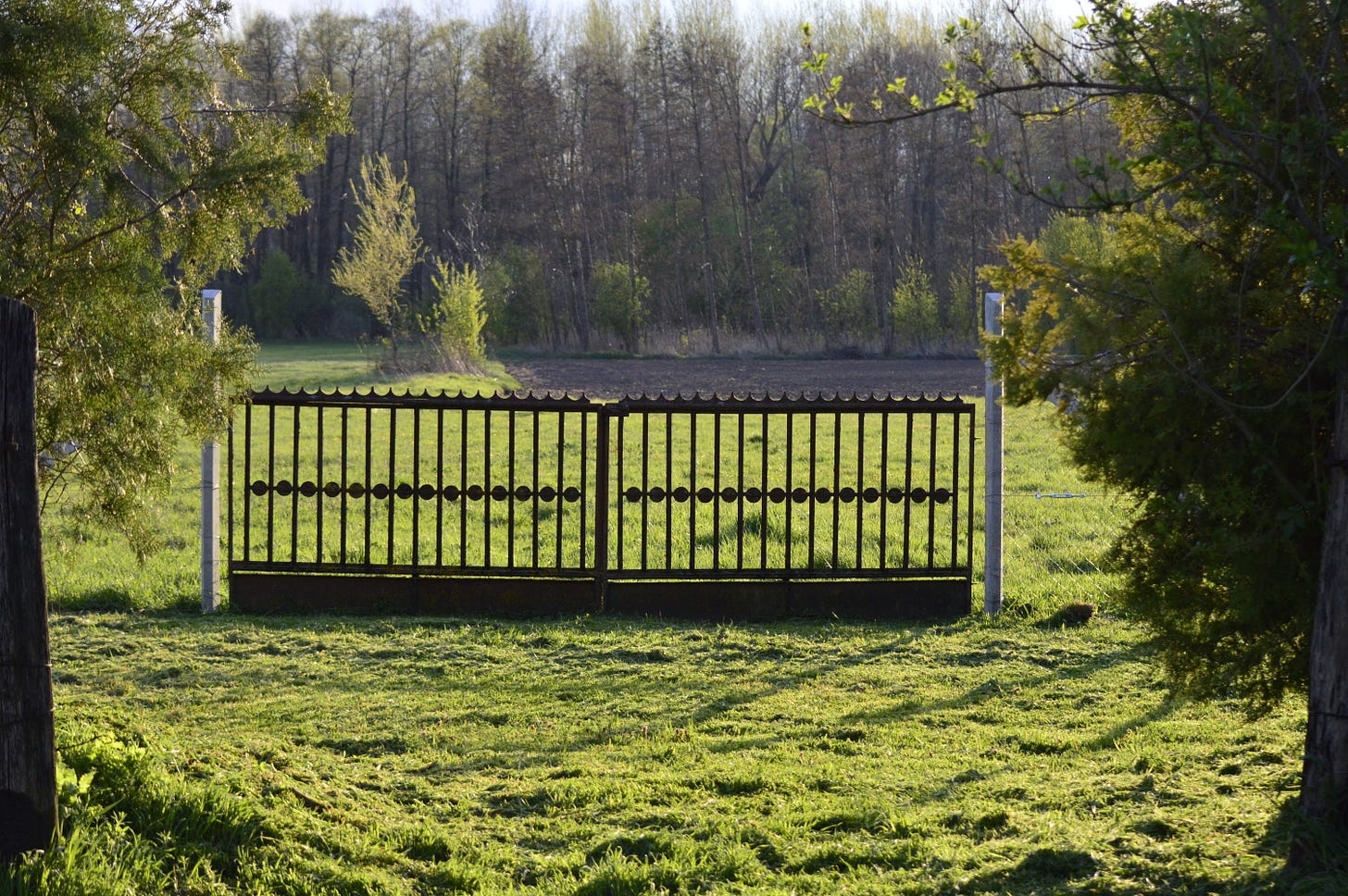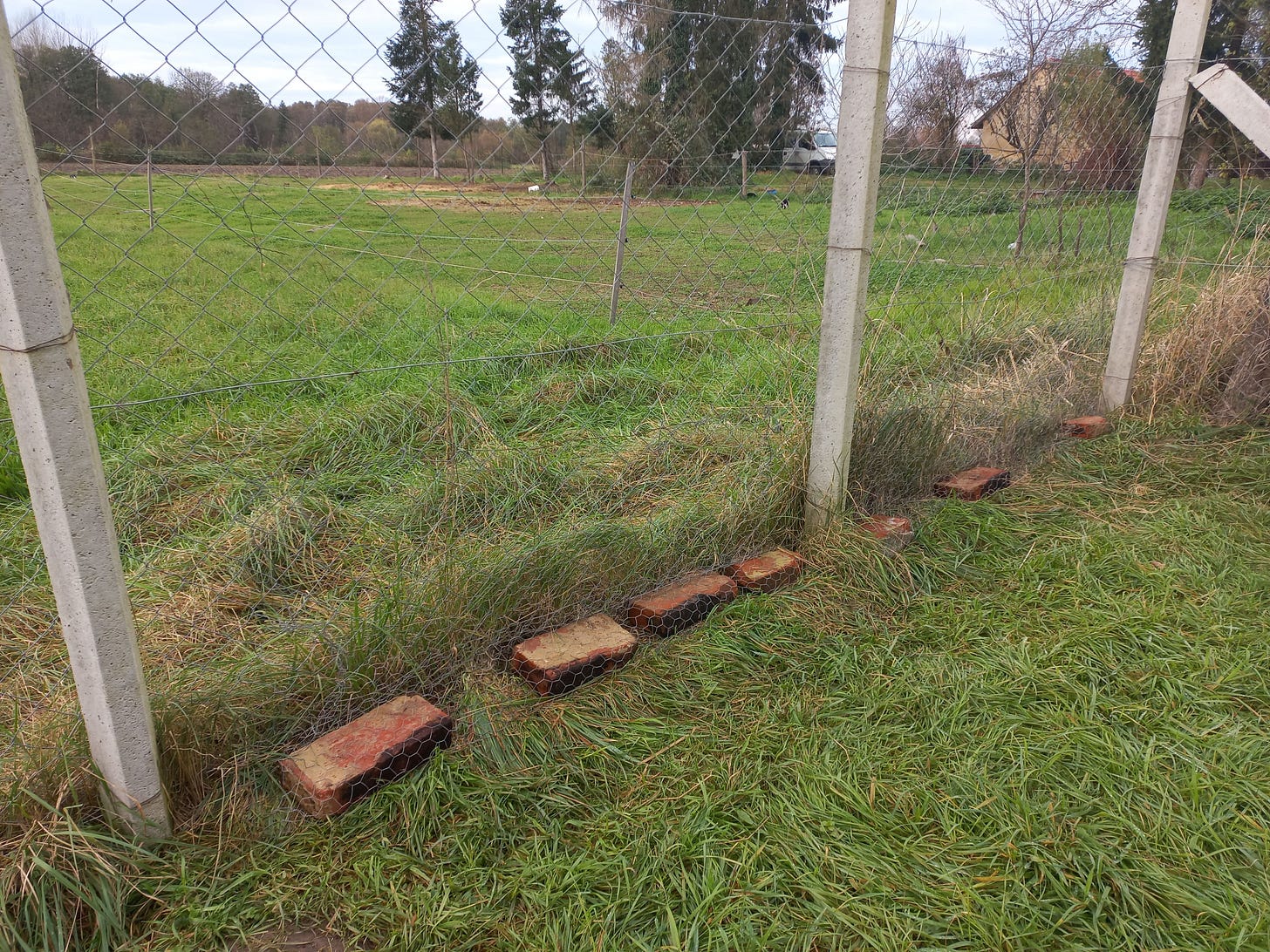Kerítés — fence — is becoming something of a big word in our household.
When mom was here in September, she remarked — and in so doing, reminded me that I, too, had found it surprising — that all the yards here are fenced in, with a small gate for the walkway and a larger one for the driveway. It’s a thing. Some of the fences are old and rusted, some are made of concrete, others are more modern or automated, but every property is fenced.
These boundaries between the private and public spaces are both useful and respected. Many people have dogs or chickens, and the fences generally keep them in. There are exceptions, of course: goats wandering in the road, pigs perusing the ditches, dogs out on the lam... but at any respectable home in the village, a sturdy fence keeps people and animals in their proper place.
In Canada, on the other hand, you pull right into someone’s driveway, walk up to the front door and ring the doorbell, stomp your feet on the doormat and attempt to peer in the frosted glass for signs of movement inside. Here, you might stand on the sidewalk at the (locked) gate and … holler. That’s what the delivery guys do, at any rate. I don’t actually know what socially acceptable protocol is. Strangers and less familiar acquaintances typically wait out at the sidewalk to be invited in. Close friends and neighbours come into the yard and knock on the door, as we do when visiting them. Just the same, until you are greeted, there remains a disconcerting feeling of trespassing on someone’s privacy. This isn’t a bad thing.
Hypothetical Conversation
Other person: What did you do yesterday?
Me: Oh, I had the house to myself! Husband was at a course, Daughter was at school! It was lovely!
Other person: Ooooh, that must have been nice! What did you do with the free time?
Me: Well, I thought about working on some writing, but then I did the dishes, and I vacuumed. And I did my laundry. I tidied the kitchen and prepped the supper. And then the dogs escaped, so I had to chase them and put them back in their kennel.
Other person: Um, oh, uh…
Me: Yes, fun times. Yeah, Rumcajsz lost his collar, but the good news is that he wasn’t fighting with the neighbour’s dogs.
Other person: hehe…
Me: So today, I split some firewood while husband hauled some earth over to the back section, and then I shoveled a trench for a makeshift brick foundation under the gate where the dogs dug themselves out, and we filled in a couple of other places where they’d started to dig holes under the fence. They’d managed to tear out some of the chicken wire repairs we’d put in last week, so I fixed those. And then I stacked the wood I’d split. And then we let the dogs out into the fenced backyard, haha, and of course the little assholes immediately ran to the back and checked their escape routes, haha. We’ll see how long it lasts. If they try it again, we’ll have to put in an electric fence.
Other person: *crickets*
I recently discovered the wonderful Kelly Brogan and listened to her interview with Christiane Northrup: it’s a fascinating and wholly relatable discussion about menopause.1
What Christiane says here about menopause being a transformative rebirth of self is true. It is really true. I’ve spoken with other women (astonishingly, some of whom don’t even know if they’re in menopause and are waiting for tests to confirm if they are because their birth control masks any natural symptoms) who expressed that they experience deep, irrational and sudden surges of anger — an impatient rage at even the smallest things. I felt that way too, and found it very disorienting — like PMS, but worse, and all the time, at anything, and with anger instead of tears. The rage was sometimes all consuming — and this is not a feeling I’m used to having.
It’s not so hard to understand, though, is it? Somehow, at 43, you find yourself in a career you used to enjoy and hoped to excel in, with no chance of advancement, enduring frustrating petty shit every day, with a boss you loathe but you have to pretend to like. Plus, you have a struggling marriage, a vengeful ex, teenagers, and no time to yourself, and on top of all that, your period can’t keep itself straight anymore, and neither can you. You’re a grown woman, for crying out loud. You’re supposed to have your shit together. What the hell is going on?
When you look back to your childhood dreams, you wonder how you ended up here, in this state. And when you look forward, you see only more of the same meaningless drudgery. It’s soul killing.
Once upon a time, you wanted to write books. You wanted to live in a cabin by the river, in peace and quiet, on your own terms. You thought you had a small chance of being someone — if not someone of importance to others, at least someone of importance to yourself. Now? A good day is listening to an audiobook on your commute, light traffic, making it to work on time, and drinking your coffee while it’s hot. What happened?
The borders of your world closed in. That’s what happened.
Back when I was a young mom, I remember writing to a friend from university about how things were different now that I had kids, how a certain selfishness had been displaced by the duty, the instinct, to care. I tried to explain it by saying that whereas before I would not have given up my share of the ice cream, small sacrifices like those were no longer a question. I didn’t even want the ice cream. I happily, willingly, gave my kids everything, first, before thinking of myself. And it was true. I wasn’t making it up. The drive to nurture and provide is very strong. I no longer knew what I wanted. I thought only in terms of obligations and what others needed of me.
The problem is that there are more than a couple of adorable, cute-baby years of self-sacrifice involved in motherhood. By the time you’re approaching 40 (an age that feels wholly impossible) — and you’re still cleaning up after children who are now teenagers or almost, and feeding and clothing everyone, including your grown-ass husband, and you start thinking of doing the groceries as the sacred “me time” they write about in women’s magazines (Costco has tapped into something, let me tell you) — you’ve lost the plot of your life. You have been derailed. Everything you thought you could be and do has been left in the past along with Santa Claus and the tooth fairy. The you you thought you could be has molded and rotted on the compost pile and oozed back into the ground, back to where your innocent ideas first came from. Oh yay, more fecundity.
Oh yeah, push that oversized cart around Costco and splurge on the six-pack of merino blend socks. That will help you feel better. (No, it won’t.)
The frustration you feel is that you have put your life on hold, you are hemmed in, and you see no way out.
The kerítés of motherhood has closed in around you, and you’ve only just now becoming aware of it. Some people have better, prettier fences than others, it’s true, fences that are hidden behind well-tended and blooming flower beds. But these fineries amount to not much more than lipstick on a pig.
First, it’s a whisper, then it becomes louder: When will I get to do the things I wanted to do? When will I get to be me? Why am I so angry all the bloody time?
You start prowling the borders of the property, walking the edge of the back fence, skirting the borders of the wilderness, sniffing out what lies on the other side (disappointingly, only more grass, cats hunting mice, some loud birds and tractors). In extreme cases, there is an irresistible yellow lab on the other side, inviting you to explore the fields and forest beyond.
But it doesn’t matter if all that lies on the other side of the fence is tall dew-moistened grass, some fresh fairy rings of mushrooms and the occasional pile of deer scat.
The urge to be free is stronger than you are. You start to dig.
(And this is why that interview is worth listening to — even, or perhaps especially, if you are the husband of a perimenopausal woman.)
Standing out there, on the other side of the field, at the edge of the forest, is 13 year-old you, her hair a tangled, greasy mess, her knees bruised and grubby, her hand-me-down clothes slightly askew, and she’s waving at you and grinning. You might have to squint to see her. At first, she might seem like nothing more than a flash of light. But she’s there, on the periphery of the wild field, beckoning you to find her once again.
You might go do that.
You might even craft a special gate into that back fence, one sized just exactly for you that your children and husband can’t fit through. Put a padlock on it, if you must, to feel safer (but make sure you have the combination or the keys); add a tether if you fear wandering off and not finding your way back.
And then, go find her — yourself — and remember what it is like to be you.
TMI: At almost 50, I’m already a couple of years into menopause. It started the year we left Canada for Hungary, which is probably not a fluke. Perimenopause was awful, albeit brief.








Perfection! More than just words in this piece. I had often viewed my pre-teen self, off in the distance, bare feet, on my haunches, picking dandelions or watching ants in the yard.
Amazingly, when I received my lung cancer diagnosis, I was ready to push through the fence to get closer to my younger self, to pursue paths previously unattainable, or so I thought. At 73 I am on the precipice of realizing who and why I am. The journey is amazing! Enjoy!
There is so much truth in here. Truth and memories I recognize and can almost taste.
Thank for your wonderful writing. 🤗😘